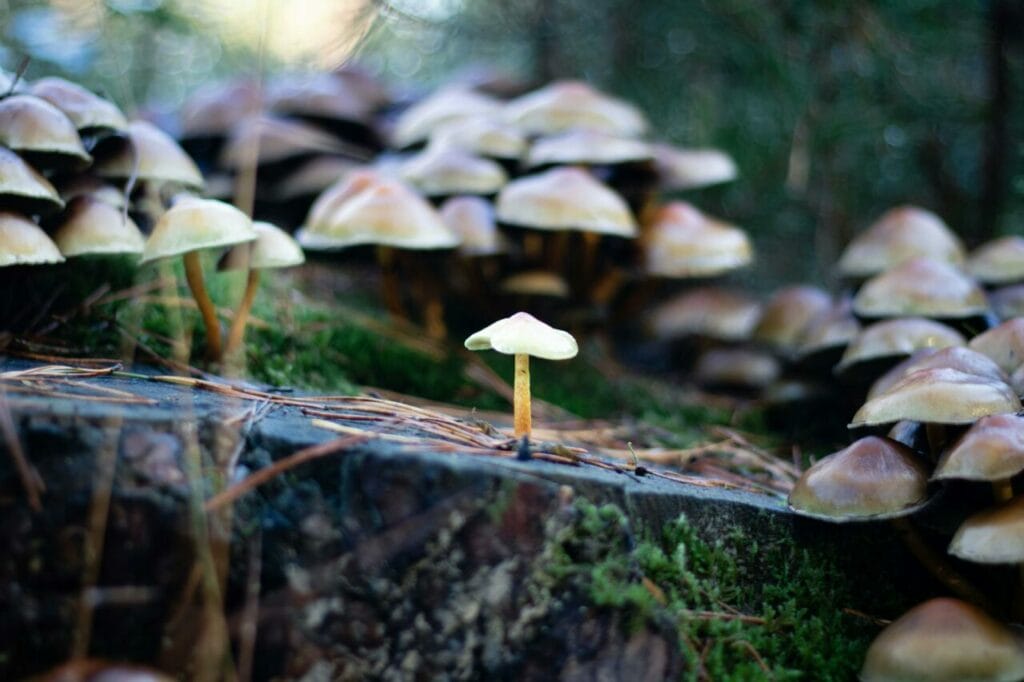Alzheimer’s Disease (AD) is a devastating neurodegenerative condition that currently has no known cure. The increasing prevalence of this disease presents a formidable challenge. Researchers are actively investigating enhanced treatment approaches by studying both natural and synthetic options.
Multiple clinical trials highlight the encouraging potential of serotonergic psychedelics such as LSD, DMT, and psilocybin, in the treatment of Alzheimer’s disease. For additional captivating information, don’t hesitate to explore online resources or consider the option to “purchase psychedelics online in Canada.”
[toc]
The Contribution of Psychedelics to Alzheimer’s Treatment
Conventional psychedelics demonstrate potential in treating early-stage Alzheimer’s Disease (AD) or mild cognitive impairment (MCI), as they may stimulate the growth of brain cells.
Psychedelics can potentially trigger neural plasticity for learning and memory by engaging specific brain receptors. This could potentially decelerate or even counteract the neurodegenerative effects of AD. Additionally, psychedelics could mitigate depression and anxiety, often linked with AD patients, by eliciting positive psychological responses.
Doubts still linger about how psychedelic treatments operate. Some suggest that profound effects from high-dose psychedelics, such as mystic experiences or a sense of ego dissolution, are essential for reaping psychological benefits. Others argue that the importance lies in the biological changes incited by these agents. Both viewpoints may have merit.
Conventional psychedelics appear to aid the brain in adjusting and reducing inflammation, even at smaller doses. Consequently, low-dose treatments could be beneficial for conditions like brain decay or migraines without significant consciousness-altering effects. However, for conditions like depression, anxiety, or addiction, the consciousness-altering effects seem vital, leading to self-reflection and behavior modifications. Hence, both low and high doses need to be explored for personalized therapy.
The Impacts of Serotonergic Psychedelics
Serotonergic psychedelics, such as LSD (lysergic acid diethylamide), DMT (dimethyltryptamine), and psilocybin (found in magic mushrooms), are garnering
The potential therapeutic benefits of psychedelics on various mental health conditions are garnering increased attention.
Experts point to serotonin receptors, celebrated for their cognition-enhancing and neuroplasticity-modulating abilities, as a promising focus for Alzheimer’s Disease (AD) research.
These compounds exert their pharmacological influences primarily by modifying the brain’s serotonin system, leading to alterations in perception, mood, and consciousness. The following points highlight findings from several studies that back this theory:
- In particular, the 5-HT2A subtype of receptors impacts the gene expression of neuroplasticity-boosting neurotrophins in brain regions affected by AD.
- These receptors control cortical signalling, which is vital for cognition, memory, and synaptic plasticity.
- Despite their irregular distribution within neurons, serotonin receptors play a role in neural development, restoration, and plasticity.
Significant Research Findings
- Serotonergic psychedelics have shown potential in alleviating aspects of AD pathology by promoting neuroplasticity.
- Classic psychedelics influence neurotransmission, promote synaptic remodelling, and enhance factors that support neuronal survival.
- Specific psychedelics, like muscimol and Sig-1R agonists, could reduce the neurotoxicity associated with AD progression.
- Classic psychedelics activate pathways in brain regions impacted by AD, implying a potential for slowing down or reversing brain degeneration.
- Psilocybin mushrooms stimulate neural plasticity, promoting neurogenesis and causing lasting changes in brain circuits.
- By targeting receptor genes and initiating modifications in neurons and networks, psychedelics enhance brain connectivity.
Clinical studies suggest that both classic and non-classic psychedelics derived from magic mushrooms affect numerous biological processes in the brain. These influences include swift changes in gene expression and substantial alterations in brain structure and function.
These psychedelics interact with receptors such as serotonin, sigma, NMDA, and GABA, leading to enhanced synaptic plasticity and brain rejuvenation. As a result, psychedelics could potentially exert positive effects on behaviour, memory, and cognition, marking them as promising therapeutic options for treating AD and related conditions.
Order Psychedelics Online in Canada
Welcome to our digital marketplace, where you can explore a wide variety of psychedelic products available for purchase in British Columbia, Canada. Begin your exploration with a reliable medicinal mushroom dispensary if you’re considering the microdosing of magic mushrooms.
- LSD
LSD is a synthetic drug derived from a fungus called ergot, which grows on rye grains. This psychoactive compound can modify perceptions, feelings, and cognitions, even in minimal doses.
Excessive intake of LSD can lead to severe hallucinations, skewing your comprehension of time and space. Be wary as substances marketed as LSD could potentially be other drugs such as NBOMe or members of the 2C drug family.
| Product | Kittease – Ketamine Microdose Troche (30x50mg) | Zenly – LSD Gel Tabs – 600ug (100ug Per Tab) | Zenly – LSD Gummies – Sour Zen Berry – 200ug (100ug Per Gummy) |
| Intended Use | Relief from stress, depression, pain, PTSD, OCD, work-related stress, performance anxiety, insomnia, and addiction. | Unforgettable experiences | Unforgettable experiences |
| Dosage | 50mg per troche / 30 per pack – 1.5 grams of ketamine/ per pack | 600ug total/6 Tabs (100ug/Tab) | 200ug total/2 Gummies (100ug/Gummy) |
| Usage Guidelines | Consume one full troche | Take one full tab to feel the full effect. Wait at least 2 hours before consuming another. | Eat one full gummy to feel the total effect. Pause for at least 2 hours before eating another. |
| Benefits | Quick-acting with minimal risk, enhanced receptivity, ideal for self-reflection and cognitive improvement. | Precisely measured dose for an optimal trip, confirmed by lab tests | Precisely measured dose for an optimal trip, confirmed by lab tests |
- Magic Mushrooms
Over 180 mushroom species are recognized to contain psilocybin and psilocin, compounds known for their therapeutic benefits and uplifting influence.
on mental health.The impact may vary based on the type of mushroom, the cultivation batch, the amount taken, and the individual’s tolerance. Some people prefer microdosing for subtle effects, while others take larger doses for a more intense experience. The quality can also vary depending on the cultivation techniques used.
Blue Meanies, scientifically known as Panaeolus cyanescens, are small dried fungi that grow best in warm tropical climates, typically on dung from cows and water buffaloes. As they grow older, they develop blue spots on their surface, which is how they got their name.
- These fungi are rich in psilocybin and psilocin, which are highly concentrated.
- They have a history of recreational use, especially among the Balinese people, who consume them during celebrations and as a source of creative inspiration.
- They are popular with tourists and travelers in Bali and similar regions due to their hallucinogenic properties. These effects could include feelings of euphoria, hallucinations, happiness, and intense laughter.
- DMT
DMT, a potent hallucinogenic compound, is found in certain plants like Psychotria viridis and Chacruna. Often called the “spirit molecule,” these regulated substances can trigger deep psychedelic experiences. They offer a brief but intensely immersive journey characterized by vivid visual and auditory hallucinations.
| Product | Dream Machine – Vape Cartridge – DMT 1ml | Integral Alchemist – ACACIA Changa Pre-Roll | Integral Alchemist – Mimosa- 1ml DMT Vape Cart |
| Description | Explore hyperdimensional realms with DMT. | Experience effects similar to ayahuasca, using a blend of herbs and DMT. | Embark on a journey of mystical visions and spiritual insights with DMT. |
| DMT Content | 1g | Approximately 90mg | 1ml |
| Instructions | Preheat the cartridge and inhale | Consume the pre-roll at a pace that suits you. | Take in the vapor for instant effects. |
| Effects | Intense hallucinations, altered state of consciousness. | An extended, visually psychedelic experience. | Spiritual awakening, elevated mood, significant changes in viewpoint. |
| Duration | Depends on the individual | May last up to 1 hour | Potentially up to 30 minutes |
The Long-Term Impact of Using Psychedelics
Current studies are exploring the long-term effects of consuming psychoactive substances. “Long-term effects” refer to any lasting changes in cognition, emotion, or memory that occur after extended psychedelic usage, an area where understanding is still developing.
The study of the long-term effects of psychedelics is complex. Some research points to potential mental health benefits, while other studies suggest possible risks, including the potential to induce psychosis.
Despite these complexities, researchers are dedicated to uncovering the effects of long-term psychedelic usage on mental health. Rigorous, long-term studies are being conducted to gather more accurate information.
Purchase Cannabis from a Accredited Supplier
Research suggests that psychedelics could significantly shift the treatment landscape for Alzheimer’s disease, potentially revolutionizing how we address neurological disorders. Experts propose that the therapeutic use of these substances could completely alter Alzheimer’s treatment, offering newfound hope to numerous patients and their families.
For premium quality products, opt for an accredited supplier such as Mushroom Dispensary Canada. Offering a wide range of cannabis products, including flowers, edibles, concentrates, and more, Mushroom Dispensary Canada assures genuine, lab-tested items that meet strict food and drug standards.
Place your order for shrooms online now.
Frequently Asked Questions
How do psychedelics differ from other substances typically used in Alzheimer’s treatments?
Psychedelics distinguish themselves from traditional Alzheimer’s medications in terms of their therapeutic approach and effects. They foster new neural connections by targeting the brain’s serotonin system, facilitating profound psychological experiences that enhance emotional well-being.
Unlike typical drugs that primarily manage symptoms, Health Canada is assessing psychedelics for their potential long-term benefits and holistic treatment approach, which includes therapy.
Research into the use
The suitability of psilocybin for conditions like obsessive-compulsive disorder, along with its safety profile in preventing multi-system organ failure, distinguishes it from conventional controlled substances.
Can psychedelic-assisted therapy be considered a viable treatment for Alzheimer’s patients dealing with end-of-life distress?
Psychedelic-assisted therapy could prove advantageous for Alzheimer’s patients in the advanced stages of their illness who are confronting the reality of their mortality.
- Offers emotional solace. This therapeutic method has shown promise in reducing feelings of anxiety and depression in some individuals, especially those critically ill. It could potentially also aid Alzheimer’s patients.
- Generally safe when supervised. Psychedelics like this, when used in a controlled setting and under the supervision of a trained therapist, are typically harmless and well-tolerated by most individuals.
- Possible enhancement of life quality. For an Alzheimer’s patient, a boost in emotional well-being can make a substantial difference, even if there is no enhancement in memory difficulties.
- Further research is required. Despite the promising aspects of this therapy, additional studies are needed to validate its safety and effectiveness for Alzheimer’s patients, particularly those in the final stages of life.
What is the typical duration of a psychedelic therapy session for Alzheimer’s patients?
- Preparation Stage. This stage involves one or two sessions, each spanning 1 to 2 hours. These meetings aim to ready the patient for the forthcoming experience, establish expectations and build trust with the therapist.
- Key Psychedelic Session. This crucial session, during which the patient consumes the psychedelic substance, typically lasts 4 to 6 hours. The patient spends this time in a controlled setting, often lying down with eye covers and listening to music, under the constant supervision of therapists.
- Integration Stage. After the session, follow-up meetings are held to help the patient interpret and integrate their experience. These sessions usually last 1 to 2 hours each, with the number of sessions varying.
Also, consider checking out:





